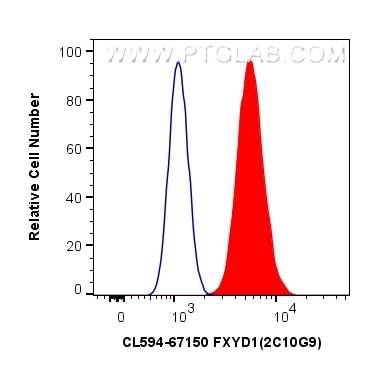Tested Applications
| Positive FC (Intra) detected in | C2C12 cells |
Recommended dilution
| Application | Dilution |
|---|---|
| Flow Cytometry (FC) (INTRA) | FC (INTRA) : 0.80 ug per 10^6 cells in a 100 µl suspension |
| It is recommended that this reagent should be titrated in each testing system to obtain optimal results. | |
| Sample-dependent, Check data in validation data gallery. | |
Product Information
CL594-67150 targets FXYD1 in FC (Intra) applications and shows reactivity with human, mouse, pig samples.
| Tested Reactivity | human, mouse, pig |
| Host / Isotype | Mouse / IgG2a |
| Class | Monoclonal |
| Type | Antibody |
| Immunogen |
CatNo: Ag25307 Product name: Recombinant human FXYD1 protein Source: e coli.-derived, PET28a Tag: 6*His Domain: 1-92 aa of BC032800 Sequence: MASLGHILVFCVGLLTMAKAESPKEHDPFTYDYQSLQIGGLVIAGILFILGILIVLSRRCRCKFNQQQRTGEPDEEEGTFRSSIRRLSTRRR Predict reactive species |
| Full Name | FXYD domain containing ion transport regulator 1 |
| Calculated Molecular Weight | 92 aa, 10 kDa |
| Observed Molecular Weight | 15 kDa |
| GenBank Accession Number | BC032800 |
| Gene Symbol | FXYD1 |
| Gene ID (NCBI) | 5348 |
| RRID | AB_3084754 |
| Conjugate | CoraLite®594 Fluorescent Dye |
| Excitation/Emission Maxima Wavelengths | 588 nm / 604 nm |
| Form | Liquid |
| Purification Method | Protein A purification |
| UNIPROT ID | O00168 |
| Storage Buffer | PBS with 50% glycerol, 0.05% Proclin300, 0.5% BSA, pH 7.3. |
| Storage Conditions | Store at -20°C. Avoid exposure to light. Stable for one year after shipment. Aliquoting is unnecessary for -20oC storage. |
Background Information
FXYD1, also named as PLM and Phospholemman, belongs to the FXYD family. FXYD1 induces a hyperpolarization-activated chloride current when expressed in Xenopus oocytes. It may have a functional role in muscle contraction. FXYD1 is a partner protein and regulator of the Na+,K+-ATPase (Na+,K+-pump). It may play a role in the acute regulation of the Na+,K+-ATPase response to exercise. (PMID: 20595385, 21653224)
Protocols
| Product Specific Protocols | |
|---|---|
| FC protocol for CL594 FXYD1 antibody CL594-67150 | Download protocol |
| Standard Protocols | |
|---|---|
| Click here to view our Standard Protocols |




